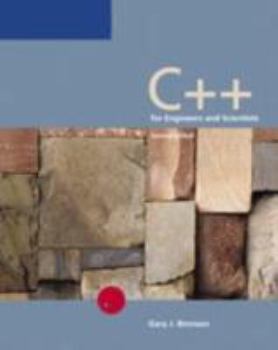C++ for Engineers and Scientists, Second Edition
Select Format
Select Condition 
Book Overview
Introduce the power and practicality of C++ programming to entry-level engineers with Bronson's C++ FOR ENGINEERS AND SCIENTISTS, 4E. This proven, pragmatic text is designed specifically for today's... This description may be from another edition of this product.
Format:Paperback
Language:English
ISBN:053499380X
ISBN13:9780534993801
Release Date:April 2005
Publisher:Course Technology
Length:864 Pages
Weight:3.10 lbs.
Dimensions:1.7" x 7.4" x 9.3"
Customer Reviews
4 ratings
Excellent Text, if a little dry and wordy
Published by Thriftbooks.com User , 15 years ago
I used "C++ for Engineers and Scientists" in a college-level programming class. It assumes no prior knowledge of any programming language, and little knowledge about the inner workings of computers. If you've had introduction to any programming language or to data storage on computers, you'll find yourself skimming past some wordy explanations in Chapter 1 (ASCII, compiled vs. interpreted languages, how computers store data, and how variables are used by the computer to retrieve data). These explanations are clear and lucid, so newbies will appreciate it -- others will pick up some new knowledge, unless they are experienced programmers. Concepts in each chapter are well-developed. Many helpful tables in each chapter outline new functions, methods, and operators. There are also many tables with conversions from Imperial to Metric, Farenheit to Celcius, and various information related to science and engineering. The first half of the book focuses on procedural programming, assuming object-oriented programming is less important for mathematics than for text-processing, at least in small programs. (Unless you're learning by yourself and want to get into the habit of using objects and classes from the start, this isn't a big deal.) More importantly, I would like instructions on how to *determine* what C++ libraries you already have, and how to obtain and install more libraries -- students/learners may be working in environments not identical to the author's. The abrupt mention of libraries and how they are used was vague and very confusing, which needs improvement to help readers avoid potential hassles. (For a superb lowdown on libraries, classes, and various compilers, read "C++ Primer Plus, Fifth Edition" (2005) by Stephen Prata [SAMS].) Otherwise, I would give this text 5 stars. However, "C++ for Scientists and Engineers" is superb for teaching you to think step-by-step, and to break down mathematical expressions into the actual individual (even looping and recursive) tasks which need to be performed. (I think of it as learning to program a calculator!) Bronson is *excellent* at teaching you to distinguish operations which seem equivalent but aren't -- such as the difference between i++ and ++i, the wrong result if you use an integer like 7 instead of a float like 7.0 in division, etc. Even non-engineers will find this slow, thorough teaching helps them avoid bad programming habits that could cause erronous results! You can use this text for learning at home, though answers to exercises are *not* in the back of the book. (Exercises are programs whose exact flow and format will vary by student/author.) If you're working on your own, you'll need some way to verify the mathematical validity of your programs' output -- you might want your pre-calculus, calculus, statistics, or physics texts handy if you're rusty on the math. (When writing any program, you should know what the results are *supposed* to be *before* running the program -- another p
C++ engineering/Scientific text
Published by Thriftbooks.com User , 15 years ago
As an adjunct professor at a local university, I needed to have a book that supplied with sample problems from engineering that my current text does not. When using these problems I will attribute their source. THis book will fulfill my goals for it.
Good book for beginner and engineering students
Published by Thriftbooks.com User , 25 years ago
It is a very good book for beginners or whoever want to refresh and advance their programming skill to C++ (like me). The only problem that I have with this book is it's a little bit too wordy, some of the concepts shouldn't be too hard to explain with short paragraph or short example.
Outstanding!
Published by Thriftbooks.com User , 26 years ago
Coming from a Engineering background, a lot of the examples in other texts were a bit dry. What I needed was a book that I could use to solve Engineering type problems. This book did not disappoint and I would say that not only is it the best book for Engineers to learn C++ in, it is the best book for anyone to learn C++ in. If you need a good Engineering applications book for C++ this is the one for you.






